Bergen County NJ Hard Water
What is Hard Water?
Most people think that hard water is primarily in the Midwest. There are parts of New Jersey, many in #BergenCounty towns, where hard water zones are prevalent. Unfortunately, New Jersey homeowners living or owning businesses in hard water zones can experience one of the most frustrating plumbing issues.
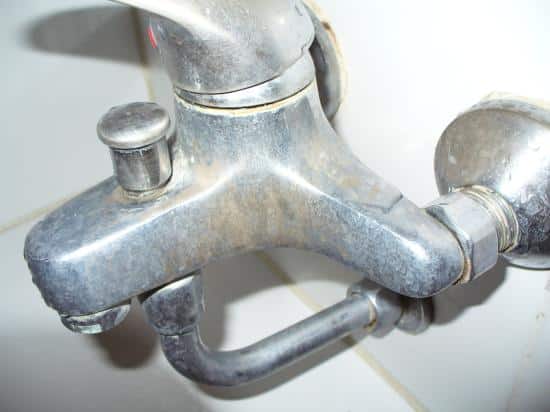
So, what is hard water? Generally, it’s water from a household faucet (tap water) with an atypically high mineral count. Why does one town have hard water and one close by does not is it purely the composite of the soil and stone bed? Such geographical features, like thick limestone layers, exist. Then when groundwater bubbles up through these layers, it picks up minute pieces of the minerals in the water supply.
The hardness of water is measured in grains per gallon (gpg), milligrams per liter (mg/L), or parts per million (ppm). Water is typically considered hard if it has a concentration of calcium carbonate above 60 mg/L or 3.5 gpg.
Hard water can cause several issues in domestic and industrial settings. For instance, it can lead to scale buildup in pipes, plumbing fixtures, and water heaters, reducing efficiency and increasing maintenance costs. Additionally, hard water can cause soap and detergent to be less effective, resulting in residue on dishes, laundry, and skin.
Water softening is a common method to treat hard water, which typically involves replacing calcium and magnesium ions with sodium or potassium ions through ion exchange. Though somewhat rare throughout most of New Jersey, many minerals like calcium, magnesium, iron, and even aluminum exist in the water supply. It can make water unpleasant to drink, bad for washing, and eventually damage NJ household plumbing and appliances.
Here are some of the signs that you might have hard water:
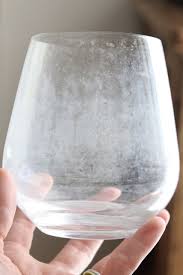
Spots on your glassware.
Hard water keeps detergents and soaps from thoroughly rinsing away debris. Whether you use a dishwasher or wash by hand, you’ll notice a gritty feel, spots, and streaks. This is partly due to dishwashing soap being unable to thoroughly be rinsed away due to the minerals above in the water.
These spots are often called “water spots” or “limescale” and are caused by the high concentration of calcium and magnesium ions in hard water. When the water evaporates, it leaves these minerals as a residue, which can appear cloudy, white, or chalky spots on surfaces.
In the case of glassware, these spots can be particularly noticeable and may require extra effort to remove them. A dishwasher with a built-in water softener, adding rinse aid, or using white vinegar as a rinse agent can help reduce or eliminate water spots. Additionally, wiping the glassware dry immediately after washing can help minimize the appearance of water spots.
Your skin feels dry.
Yep, that soap scum that won’t come off your shower doors likely won’t come off your skin, either. Depending on the severity of the problem, especially on sensitive skin, it might be time to investigate installing a water softener system in your home.
The high mineral content can interfere with the effectiveness of soaps and cleansers, making it harder for them to create a lather and adequately clean the skin. This can leave a residue on the skin, which may cause dryness, irritation, or itchiness. The minerals can also clog pores, potentially leading to acne breakouts or exacerbating skin conditions like eczema.
However, not everyone will experience these adverse effects, and some individuals might not notice any difference in their skin when using hard water.
To minimize the potential impact of hard water on your skin, you can:
- Use a gentle, soap-free cleanser designed for sensitive skin.
- Install a water softener in your home to reduce the mineral content of your water.
- Apply a moisturizer after showering or washing your face to help keep your skin hydrated.
- Use a showerhead filter to remove minerals and other impurities from the water.
- Limit the duration and temperature of showers, as hot water can strip away natural oils from the skin, exacerbating dryness and irritation.
Streaky shower doors.
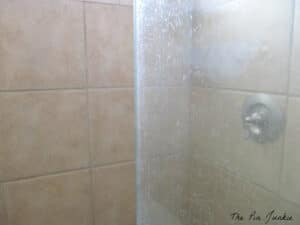
The same reason that soap sticks to glassware and dishes cause white streaks to be left behind even when you rinse off your tub and shower doors. Do not mistake soap scum for mildew. Mildew can also stick to tubs and showers but will have a darker, often black color, and cleaning with specially designed mold and mildew cleaner will quickly dispose of it. On shower doors, white vinegar will help break down the mineral content and leave a fresh scent.
The high mineral content in hard water, specifically calcium and magnesium ions, can leave deposits on surfaces as the water evaporates. These deposits, often called “water spots” or “limescale,” can create streaks or cloudy, white, or chalky spots on glass shower doors and other surfaces.
To prevent or minimize hard water streaks and spots on glass shower doors, you can:
- Install a water softener in your home to reduce the mineral content of your water.
- Use a squeegee or a microfiber cloth to wipe the glass shower doors immediately after each use to remove excess water before it can evaporate and leave mineral deposits.
- Clean the glass shower doors regularly using water and white vinegar, which can help dissolve mineral deposits. Make sure to rinse the doors thoroughly and dry them afterward.
- Apply a water-repellent product designed for glass surfaces to create a protective barrier, making it more difficult for water spots and streaks to form.
- Use a showerhead filter to remove minerals and other impurities from the water.
Coffee tastes odd.
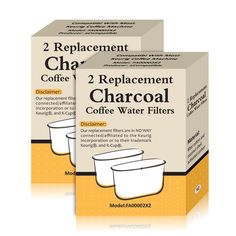
When those minerals make it into your coffee pot, they can build up over time. Microscopic bits will come loose after naturally drying in the coffee maker. Many manufacturers of coffee makers, like Keurig, include an activated charcoal filter to minimize the problem. Our best advice, buy bottled spring water (store brands often sell for less than $1) unless your refrigerator or sink has a filtration process.
The high levels of calcium and magnesium ions in hard water can influence the coffee grounds’ extraction process and the brewed coffee’s overall taste.
When coffee is brewed, water extracts compounds like acids, oils, and flavors from the grounds. Due to its high mineral content, hard water can interfere with this extraction process, leading to an unbalanced and potentially undesirable flavor profile. The minerals may cause the coffee to taste overly bitter, dull, or metallic.
Moreover, the scale buildup from hard water can accumulate in coffee makers and espresso machines, potentially affecting their performance and efficiency. Regularly cleaning and descaling your coffee equipment can help minimize these issues.
Using filtered or bottled water, which has a lower mineral content, can improve the taste of your coffee. Alternatively, installing a water softener in your home can reduce the hardness of your tap water, resulting in better-tasting coffee and reduced scale buildup in your coffee equipment.
Drains Tell a Tale.
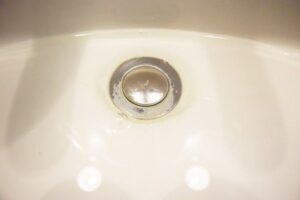
One of the most apparent places hard water is known is on the drain in your kitchen sink. What once was a completely shiny chrome sink drain begins to show wear, usually on one half of the drain. It can also affect the drains for your dishwasher, clothes washer, and, dryer. Even your ice maker can be involved, reducing the performance and lifecycle of those expensive appliances.
Muccia Plumbing, Heating & AC has dealt with the challenges and solutions for hard water in New Jersey for over 50 years. And while it varies from town to town, if you’ve noticed any tell-tale signs mentioned above, do not hesitate.
Contact Muccia Plumbing, Heating & AC today at 201-343-1414 or visit us at https://mucciaplumbing.com and let one of our trained hard water technicians inspect and test your water and provide some great suggestions on reducing its impact on your home.
About Muccia Plumbing, Heating & AC
Exclusively Serving Bergen County, New Jersey
Michael Muccia is a Master Plumber and the owner and operator of Muccia Plumbing, Heating & AC. Muccia Plumbing, Heating & AC is a full-service Heating, Ventilation, and Air Conditioning (HVAC) service company based in and serving Bergen County, NJ, since 1978. The Muccia Plumbing, Heating & AC team of trained and certified service technicians offers various services, including general plumbing and heating maintenance, for residential and commercial clients.
Whatever your plumbing, heating, air conditioning, or ventilation needs are, it’s easier with Muccia Plumbing, Heating & AC. We treat our customers, large and small, with the best service in the industry. We know you have a choice when considering an HVAC company, and no matter what we do for you, we treat it as the most crucial job in our history. Our experience proves that we know how to work efficiently, which keeps costs low, uses only the best components within budget, and stands behind the work we do.
Muccia Plumbing, Heating & AC has locations in the following areas:
Hackensack | Hillside | Ramsey | Waldwick | Maywood | Tenafly

